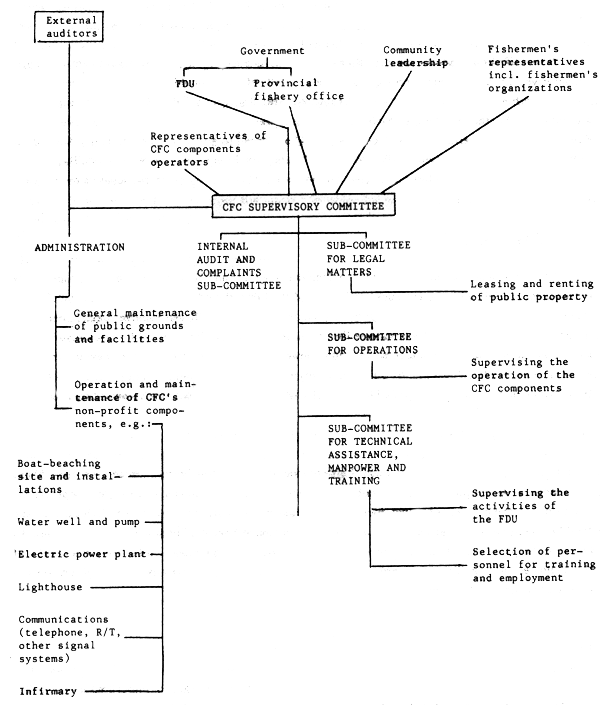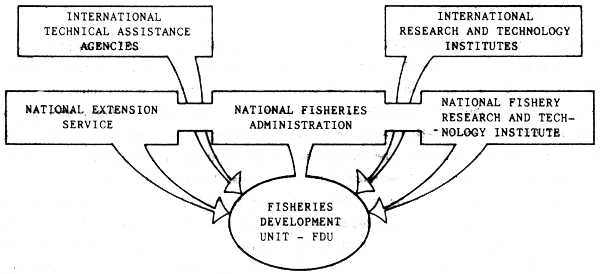The objectives and functions of FDU (Fisheries Development Unit) is described in an earlier Chapter. Here we shall deal briefly with some of the more practical aspects of the FDU/CFC relations.

Figure 14 Participatory Supervision and Direction of CFC Operation
A well functioning FDU will be instrumental in the establishment, maintenance of the technology, and operation of the various components in the CFCs within its area of operation. Figure 4 illustrates the functions and responsibilities of FDU and Figure 15 the main outside institutions contributing to the FDU professional and operational performance.
In deciding the location of the FDU, the geographical situation of the CFCs may prove to be the ruling factor with the FDU based in the largest of the fishing communities, or in that nearest to a road or rail link to the main township in the province. Other factors which must be taken into account are the availability of suitable accommodation for the team members, and, of postal, telephone and other communication facilities and travel links to large cities. Where very low living and housing standards prevail, it may be difficult to recruit expatriate and national experts from the cities without some guarantee of reasonable though modest living conditions, as judged by their standards. In some situations this may require housing for the FDU staff in the nearest town where appropriate accommodations are available, the FDU staff then travelling daily to the CFCs. Where the nearest town is too distant from the CFCs for efficient and satisfactory activity of the FDU workers, special accommodation may need to be provided for them at a more convenient site. Satisfactory experience has been reported with pre-fabricated houses, campers, house-boats and specially constructed or modified local style houses.
Where possible and feasible, the FDU staff, especially during the initial establishment phase, ought to include members of the preparatory Planning Team. The advantage of the accumulated local knowledge and experience and local contacts is so obvious that we should not have to deal with it further.
The professional composition of the FDU teams will depend on the nature of the problems to be dealt with, the character of the CFC components, and the lines for development decided on, as well as the availability of local skills. The team will usually include at least a few technical specialists such as, for example, an engineer mechanic, a fish processing specialist, a boatbuilder, a fishing technologist, a small business manager or others.
Although, ideally, the FDU team would be made up wholly of nationals and still better, of local people, in many cases expatriate specialists would have to be included in the FDU personnel.

Fig.15 - FISHERIES DEVELOPMENT UNIT (FDU) OUTSIDE CONNECTIONS
Experienced expatriate specialists are expensive and it is therefore important that those recruited are given the conditions to apply their skills. In some cases, it may be possible to replace them after some time with expatriate volunteers, associate experts and the like who could do the job at less cost and who may be more apt to accepting the sometimes arduous local conditions. It is advisable, however, that before the young expatriates are left to execute the job on their own, they are initiated by experienced specialists and spend some time (from several months to a year or more) working under the supervision and advice of the latter. Technical assistance agencies and governments have often faced the problem of finding the right man at the right time to do the job at hand, and more than once unsuitable expatriate staff have contributed to past failures.
It is important, therefore, that the expatriate has the depth of experience and the expertise suitable for the job at hand and the drive and enthusiasm necessary to pass them to the local people under the often difficult conditions. It has been said that the value of an expert lies rather in the ideas, experience and skills which he leaves behind in the minds of the national staff - than in the number and length of the reports which he leaves stacked on the shelves in the offices of the various ministries and international assistance agencies.
When it is necessary to engage expatriate specialists, efforts should be made to pair each one of them with a counterpart national who would eventually replace him. Appointment of formal “counterparts” who, in fact, continue to perform other duties out of the FDU ought to be strongly resisted. The national counterparts should receive continuous on-the-job training, which, if necessary, might be supplemented by additional formal or specialized training inside or outside the country. As already mentioned elsewhere, equipment manufacturers are giving specialized training in the maintenance of their products at their plants or at their local agencies. Such opportunities should be exploited by the FDU for training the counterparts and also operators of CFC components as well as other users of the equipment, if necessary, as a condition for its acquisition.
One of the problems of the counterpart system at specialist level is the often wide gap between the salary of the expatriate and that of his counterpart, though they may both possess equivalent technical - if not practical - qualifications. In many cases, a simple and truthful explanation may help. The local counterparts should be made aware that the expatriate has to be paid not less than he was making in his home country and that a compensation for leaving home and moving, sometimes with his family, to a strange land and often much worse living conditions must be allowed for. On the other hand, also national specialists recruited in the cities, must be offered reasonable remuneration. Even so, it may sometimes be a problem to persuade qualified nationals to work side by side with the fishing folk in small fishing communities, especially in rugged conditions a long way from an air-conditioned office, or a modern workshop in the city.
The FDU organizers and its leader should insist that the national counterparts are working full-time in tandem with the respective expatriates. Previous experience indicates that in many cases already pretty busy government officers are appointed as “counterparts”, but spend very little time on actual training and on assisting their experts. Where a reason for this situation is inadequate budget of the respective government service, financing of counterpart experts' wages and operation expenses (housing, travel, per diem, etc.) should be included in the Programme budget.
In some cases the government may prefer that some or all of the FDU's national technical specialists are not civil servants, but are instead recruited and paid through a semi-autonomous government agency or a non-government organization or a body such as CFCs. This alternative has a number of advantages:
the government does not have to transfer officers from important tasks they may already be working on;
by not limiting the national FDU staff to only those already in government service, the chances of obtaining the right technical specialization and practical experience may be increased;
the problem of temporary or permanent transfers of good FDU team members to other, administratively more urgent duties is avoided;
the national FDU team members can be paid a wage which is sufficiently high on the national scale to both attract and hold good technicians, even if it exceeds the regular civil service wages;
it avoids the difficulties associated with government freezes on hiring new personnel; the wages of the national FDU team members may come from project budgets or charges on the CFC's components themselves, rather than directly from the government department budget;
being dependent on the CFC for their continuing employment, the national FDU team members will have a good incentive to work hard and to the fullest satisfaction of their “clients” at the CFCs.
Apart from all the qualities generally required from a team leader acting under rather complex conditions, the FDU head should have a considerable experience in small-scale, artisanal fisheries. Desirably, he himself should be an expert in one of the main fields to be developed in the CFCs supported by his FDU. In some cultures where age matters, he should not be too young. It is most helpful, if the team leader, in addition to his particular profession, is also a “generalist”, i.e., is able to advise on a wide array of problems encountered by the CFC operators and enterpreneurs, including relations with outside institutions, authorities and businesses, ad hoc economic evaluation of operations and proposals, etc.
Above all, however, the team leader is responsible for the efficient activation of his team and for the administration and logistics involved.
A very good and valid guidance concerned with the organization, equipment and management of an institution in many respects similar to the FDU is given in the FAO Technical Paper FIIT/T199: THE FISHING TECHNOLOGY UNIT (see References: GROFIT, E. 1982). The reader will find in that publication much of the required detailed information, particularly with respect to staffing, work programming, logistics, etc.
The work of the FDU should follow a strictly observed schedule. Each CFC should be visited at least once a week by a pair or more of the FDU workers. The visiting party should be able to contact the FDU office by radio or by telephone so that if urgent technical attention is required, the right expert can be called in.
The visiting FDU crew should be active in seeking out weak points in the maintenance of machinery and in the management of CFC components, even when they are operated by private individuals and even if they are privately owned. This sort of assistance would require good relations between the FDU people and their “clients” and, in particular, the establishment of their professional and technical credibility.
Every repair, preventive maintenance and any other assistance should be performed with the participation of the local operators so that they may learn the “hows and whys” of their equipment.
In some cases, it is desirable that the FDU crews have well publicized hours and places where they can be approached by the local people.
The feasibility of the use of written material should be judged by the general literacy level. Where people are generally literate in their own language, current information and translated training material could be published in the form of “fishery leaflet”, “CFC news”, etc., and issued periodically by the FDU. Where at least some of the local people can read one of the FAO languages, fishing and other manuals, for example “POP” manuals of the FAO Training Series and FAO Better Farming Series, could be distributed. On the other hand, it would not make much sense to invest time, money and effort in publication of material which only very few can read.
A well established and functioning CFC/FDU complex can serve as a model for fishing folk and government fisheries staff from other areas. These people may be assigned to the FDU for varying periods of on-the-job training or to participate in short courses organized by the FDU. This activity could help to promote the expansion of the CFC/FDU concept to their areas.